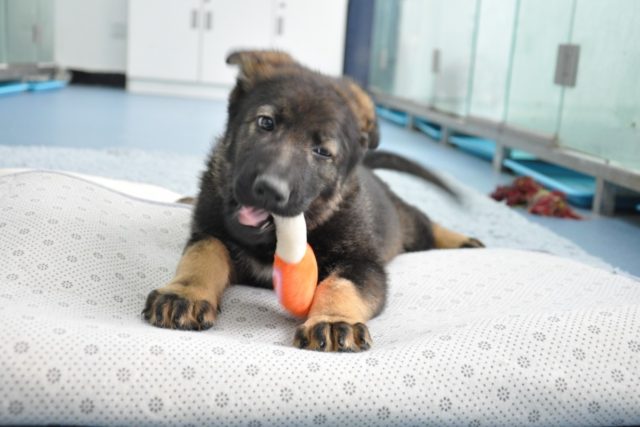At a special ceremony held by the Police Dog Base of the Beijing Municipal Bureau of Public Security, six cloned dogs were officially welcomed into the Police Force this week. The trainers adorned the cloned dogs with badges, collars and new uniforms.
Cloning is the process of creating genetically identical individuals of an organism either artificially or naturally.
As per State-run Xinhua News, the Police Dog Base began working with a pet-cloning company, called Sinogene, early this year to produce six cloned dogs based on skin samples of two police dogs who had displayed excellent performance on the force.
The two donor dogs are called Sidingji and Ari. Nurtured by the Beijing Dog Base, Sidingji is a five-year-old Belgian Malinois. It is one of the best among its peers bred.
Because of their outstanding sense of smell and unequalled intelligence, they have achieved numerous merits from the police bureau. Ari is a four-year-old dog imported from abroad who excels at biting and anti-pressure ability, acceleration, and aggression.
Ma Jinlei, a police officer engaged in dog training techniques, said, “Researching how to pass down the genes of excellent police dogs has been an important task for the base in recent years.”

“The cloned dogs are only around four months old, but they have exhibited the same abilities as six-month-old non-cloned police dogs in terms of memory, courage, and aggression”, he added.
The base will be further collaborating with enterprises on the research of batch cloning of police dogs. Further, the establishment of a ‘dog cell bank’ to properly conserve and use top-notch police dogs are also in the talks.
Also Read: Back In Time: 21 Years Ago, Dolly Became The Most Famous Sheep In History
Animal Cloning Is Not New
South Korea was the first country to introduce cloned dogs for police or military use in 2007.
In February 2009, India had created the world’s first cloned buffalo. The breakthrough had put India among a select few countries capable of cloning mammals.
In March this year, China cloned its first puppy called Kunxun. It was bred using DNA from an award-winning police sniffer dog.
“We hope in the next 10 years, once the technology becomes more sophisticated, to mass clone exceptional police dogs,” Wan, the analyst of Kunxun’s cloning project, said.
At this point, the dogs are still in their experiential phase. After six months, the young dogs will enter a “university” where they will be strictly trained and closely monitored. They will specialise in tracking, drug detection, security or evidence detection.
Is Cloning Animals For Specific Purposes Morally Acceptable?
At first glance, China cloning dogs for its security program seems really wonderful. But, there are a lot of ethical questions related to cloning that have yet to be answered.
What if some cloned dogs do not show the same excellence that their donors did? Will they be considered a burden and eliminated?
Moreover, cloning itself raises a lot of questions. As the process becomes increasingly prevalent, governments and companies will start creating mindless animals to use as organ banks.
China had also introduced five genetically edited monkeys who were cloned to test drugs to treat mental illnesses. This is also morally questionable as cloned animals are still sentient beings who feel pain and have a sense of self. So, is conducting experiments on cloned animals justified?
However, there are many benefits of cloning animals as well. So far, it has been noticed that the cloned animals are responding even more excellently than their donors did. So, cloned animals not doing well will be an anomaly.
For now, the answer to this question remains open-ended as cloning covers a large swathe of unchartered moral and ethical dilemmas.
Image Sources: Google Images
Sources: CBS News, Xinhua Net +more
Connect With Blogger: yuksxo








































